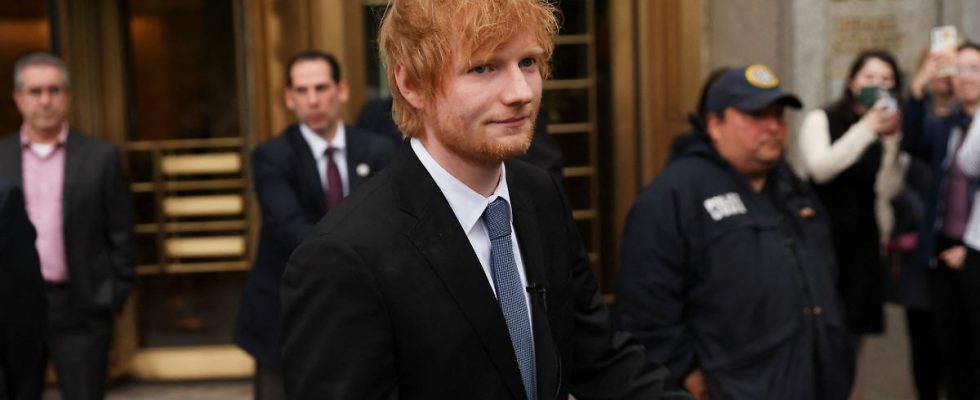Created song “independently”.
Ed Sheeran is cleared of plagiarism charges
5/4/2023 9:26 p.m
Victory for British singer-songwriter: Ed Sheeran did not copy soul legend Marvin Gaye for his hit “Thinking Out Loud”, according to a jury in New York unanimously. After the process, which the music industry was particularly observing, the pop star was relieved. He could keep his job.
British pop star Ed Sheeran has won a high-profile trial over allegations of plagiarism in New York. A jury unanimously acquitted the 32-year-old singer-songwriter in a civil trial of having copied Marvin Gaye’s 1973 soul classic “Let’s Get It On” for his hit “Thinking Out Loud.” Sheeran did not commit any copyright infringement but created the song “independently” in 2014.
After the verdict was announced, which has far-reaching implications for the music industry, Sheeran hugged his legal team. The singer then said outside the courthouse that he was “happy” with the verdict. He doesn’t have to give up his job after all. The Manhattan federal jury “protected the creative process” of musicians around the world. At the same time, he was “incredibly frustrated by unfounded allegations” as in this case.
The heirs of Ed Townsend, who wrote “Let’s Get It On” with Marvin Gaye, had sued the British singer. Townsend’s heirs spoke of “striking similarities and apparent common elements” between “Let’s Get It On” and Sheeran’s “Thinking Out Loud”. As evidence, they cited, among other things, that the band Boyz II Men has already performed medleys of the two songs – and Sheeran has also mixed the two pieces at performances. Sheeran’s attorneys said there were “dozens or even hundreds of songs” before or after “Let’s Get It On” that used “the same or similar chord progression.” A musicologist called as a witness by the defense confirmed this, saying the four-chord sequence in question had been used repeatedly in songs even before Gaye’s 1973 hit.
Music industry looks at process: Which song elements are protected?
During the civil trial, Sheeran himself testified – picking up the guitar to play the crucial four chords. The ballad “Thinking Out Loud” was released in 2014 and stormed to number two on the US Billboard Hot 100 chart. In 2016, the hit won a Grammy for best song of the year. Sheeran co-wrote the track with singer-songwriter Amy Wadge.
The civil trial in New York was followed with great interest by representatives of the music industry. The procedure dealt with the fundamental question of which musical elements of a song are protected by copyright and whether, for example, certain chord progressions can be used by different musicians. Industry officials had feared that a verdict against Sheeran could lead to a new spate of lawsuits – and that it could have a chilling effect on songwriters.
In recent years, courts have made various rulings on copyright in music. In 2015, the two US musicians Pharrell Williams and Robin Thicke were sentenced to pay millions to Marvin Gaye’s heirs in connection with allegations of plagiarism in connection with their song “Blurred Lines”, because they withdrew from the hit “Got to Give It Up”. Should have served in 1977. The British rock band Led Zeppelin, on the other hand, was acquitted in 2016 of having stolen the intro of their legendary song “Stairway to Heaven” from the US formation Spirit.

